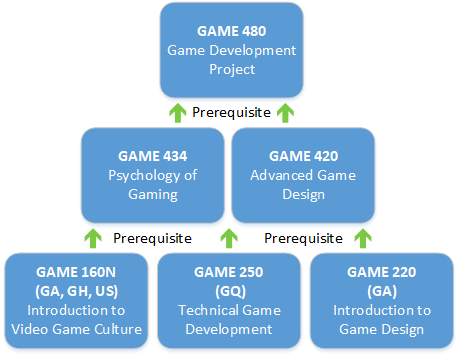In 2015 the video game industry reported $23.5 billion in revenue1. The United States and global games industry continues to be one of the most diverse and healthy available for job-seekers. In the United States alone, the game industry employs more than 32,000 people across 34 states. Game development in the United States allows entrepreneurs to place their products in a global multi-billion dollar market.
The Game Development minor at Penn State Wilkes-Barre will teach the skills and techniques required to develop modern video games. The program will focus on video games, but will also look at other forms of gaming such as card and board games. The minor is designed to complement a diverse set of majors; it fits nicely into a four-year schedule, enhancing student learning and marketability while aiding in the completion of general education credits.
Frequently Asked Questions
Who can complete this minor in Game Development?
This minor is for any students who intend to complete their four years of education at Penn State Wilkes-Barre or for those who intend to change campuses. Game Development goes beyond computer programming; it is interdisciplinary in nature, as it also explores the artistic, social and psychological aspects of video games. Students majoring in Computer Science, IST, Business, and Engineering may benefit the most from the skills taught in this minor, although it can fit most Penn State majors.
Are you required to be in a specific major to enroll in this minor?
Due to its interdisciplinary nature this minor is a good complement to many of the majors offered at Penn State. Students who plan to finish their degree at another campus can complete the minor before transferring. The highest math level required is College Algebra I (Math 21).
How long will it take for me to complete the minor in Game Development?
You can complete the minor in as little as three semesters. It requires 18 credits, although some of the specific courses required by the minor can also be used to fulfill requirements for your current major. In addition, several of the required courses in the minor can be used to fulfill some of the General Education requirements at Penn State. Please consult with your adviser to plan the best sequence of courses to take while at Penn State Wilkes-Barre.
Do I need any programming experience for this minor?
Passionate about gaming but worried about your technical skills? Students entering this minor do not need prior programming or technical skills. The minor will cover the tools and techniques needed to successfully create video games. A portion of the courses required for this minor are nontechnical in nature. Educational, simulation, and entertainment categories of games will be covered.
Required Courses
The minor consists of 18 total credits:
- 9 credits of Breadth courses (100 and 200 level)
- 6 credits of Depth courses (400 level)
- 3 credits in a Senior Project course (GAME 480)
Students can take these in any year of enrollment; however, the courses are designed to be taken in ascending order, since many require a prerequisite. (Note: more detailed course descriptions can be found in the online course catalog.)
GAME 160N: Introduction to Video Game Culture (GA/GH/US)
This course offers students an exploration of video game culture and history, starting from arcades and progressing to contemporary systems. Through this comprehensive study, students will gain a deeper understanding of video games' cultural impact and historical significance, and its role in shaping our modern world.
GAME 220: Introduction to Game Design (GA)
Design of games as aesthetic objects and cultural artifacts that people find meaningful and entertaining.
GAME 250: Technical Game Development (GQ)
Students will explore the tools and techniques for crafting video games. This course provides students with the knowledge and skills to develop prototypes, playtest them, and prepare for more advanced game development challenges. Prerequisite: MATH 21
GAME 420: Advanced Game Design
Develop the habits of successful game designers — playing games thoughtfully, and documenting those thoughts. Prerequisite: GAME 220
GAME 434 (PSYCH 434): Psychology of Gaming
Upper level course examining the core psychological principles as they apply to the topic of games. Prerequisite: 3 credits of psychology or 3 credits of a gaming course
GAME 480: Game Development Project
Upper level course examining the core psychological principles as they apply to the topic of games. In this course students are assembled into teams and take the entire semester to create a game that will be published.
Course Road Map
Semester 1 (Fall)
- GAME 160N: Introduction to Video Game Culture
- GAME 220: Introduction to Game Design
- GAME 250: Technical Game Development
Semester 2 (Spring)
- GAME 420: Advanced Game Design
- GAME 434: Psychology of Gaming
Semester 3 (Fall)
- GAME 480: Game Development Project
Note: Additional courses may be offered over the summer or as enrollment allows.
1 Source: https://fortune.com/2016/02/16/video-game-industry-revenues-2015

